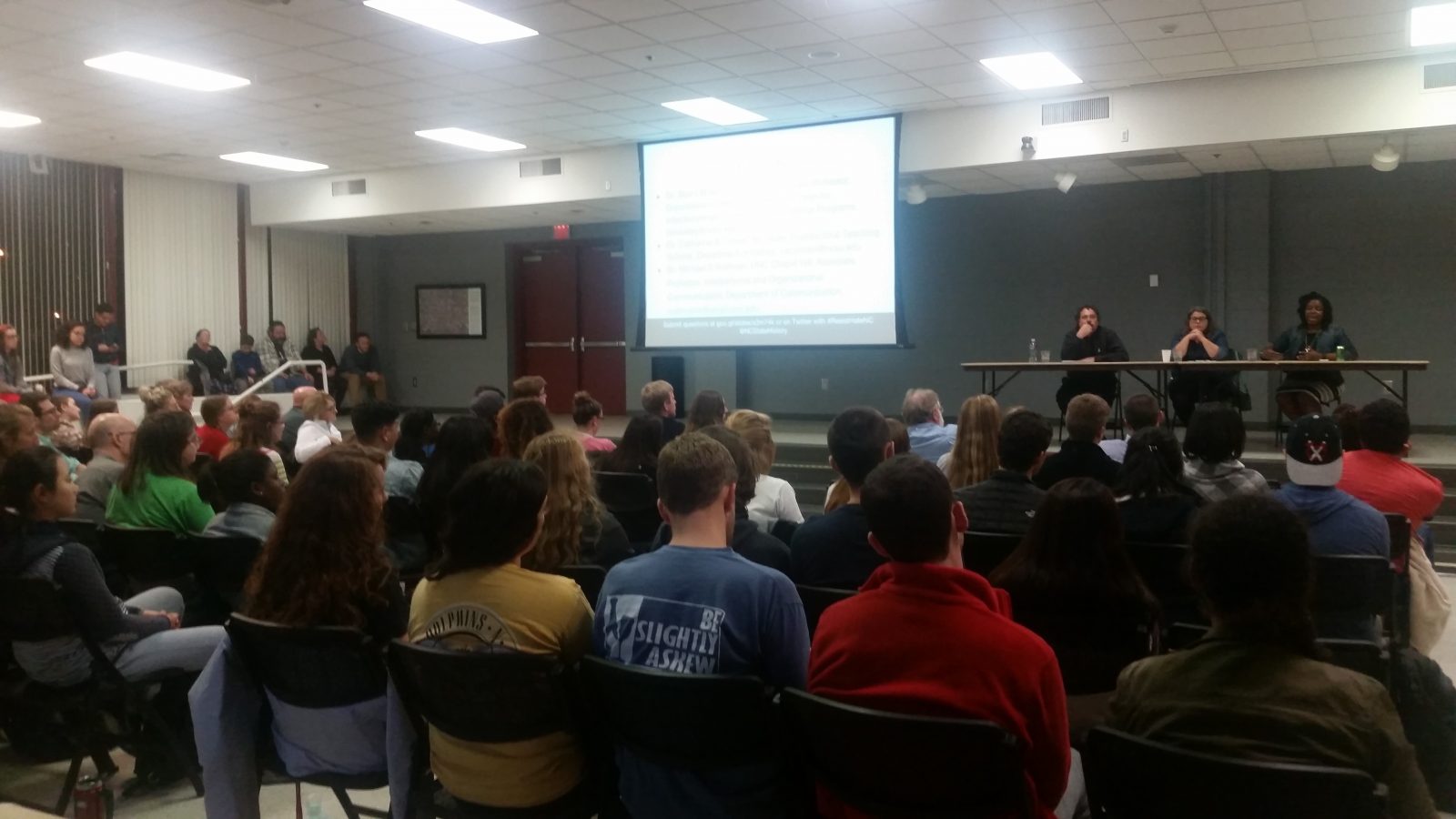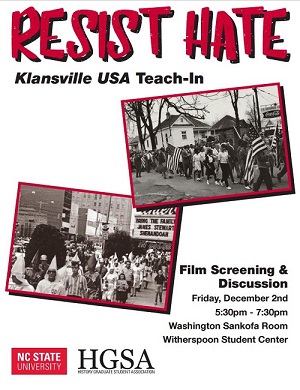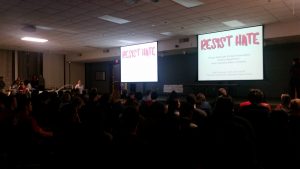
With only three weeks to prepare, students didn’t know if they had gotten the word out in time about their Resist Hate Teach-In. But as people started filing in, their worries turned from “will they come” to “will there be enough seats.”
 Public History PhD student and History Graduate Student Association co-President Katie Schinabeck was concerned about the increase in hate speech prior to and after the Presidential Election. She wondered how the graduate student community could use their skills as public historians to engage in a dialogue about contemporary issues. She corresponded with Associate Professor Tammy Gordon who suggested that since the Ku Klux Klan were planning to hold a rally in North Carolina in December – perhaps a Resist Hate Teach-In might be the place to start.
Public History PhD student and History Graduate Student Association co-President Katie Schinabeck was concerned about the increase in hate speech prior to and after the Presidential Election. She wondered how the graduate student community could use their skills as public historians to engage in a dialogue about contemporary issues. She corresponded with Associate Professor Tammy Gordon who suggested that since the Ku Klux Klan were planning to hold a rally in North Carolina in December – perhaps a Resist Hate Teach-In might be the place to start.
Schinabeck loved the idea and sent out an email to the History Graduate Student Association calling for a meeting to discuss the Teach-In idea. She figured if at least four people showed up, they could organize something. But as it turned out thirteen students and four faculty members came and all were on board with the Teach-In idea.
Because the Klan were marching in three weeks, they had to work fast. Since the goal was to use history to address a local problem, Gordon suggested showing the PBS documentary “Klansville USA” which details the history of the Klan in North Carolina. Students were assigned to committees and the Program Committee chose panelists who could draw connections from the film to the present as well as address how to handle and resist the Klan. To that end, NC State faculty Dr. Blair Kelley, a professor of African American history, and Dr. Catherine Connor, who studies the South and the Civil Rights era, were chosen. Also invited was Dr. Mike Waltman, from the UNC-Chapel Hill Department of Communication, who teaches the rhetoric of hate.

The Resource Committee gathered the resources to guide the programming and make sure they were using Best Practices for public history. The Media Committee designed the poster and got the word out about the event while the Facilities Committee found the space. A Watch Committee monitored the Klan’s activities. The Takeaway Committee made brochures on the history of the Klan and on community organizations that work on hate. Finally, an Evaluation Committee evaluated the program so they could replicate it for future events.
 On the day of the event, Schinabeck was anxious only a handful of people would come — “It’s the only thing I lost sleep over.” But the Media Commitee had done its job well, and on the evening of December 2 over 165 students, faculty and members of the community showed up. Dr. Susanna Lee kicked off the event with a brief history of the Klan and then the documentary was shown. Following the screening, the panelists commented on the film and the floor was opened to discussion. Some people asked historical questions about the Klan, while others who are concerned about the current political situation asked questions about the Klan’s resurgence, why they are feeling emboldened and if there is going to be more of these sort of racist actions and demonstrations in the near future.
On the day of the event, Schinabeck was anxious only a handful of people would come — “It’s the only thing I lost sleep over.” But the Media Commitee had done its job well, and on the evening of December 2 over 165 students, faculty and members of the community showed up. Dr. Susanna Lee kicked off the event with a brief history of the Klan and then the documentary was shown. Following the screening, the panelists commented on the film and the floor was opened to discussion. Some people asked historical questions about the Klan, while others who are concerned about the current political situation asked questions about the Klan’s resurgence, why they are feeling emboldened and if there is going to be more of these sort of racist actions and demonstrations in the near future.
“I was very happy with the level of discussion. It was clear that people really paid attention to the documentary and came away with an understanding of the current political climate.” – Katie Schinabeck
The Resist Hate Teach-In was an entirely student-initiated and student-sponsored event.
Footnote: Possibly due to the presence of protesters, the original Klan rally which was supposed to take place in Pelham was canceled and replaced with a Klan motorcade through the town of Roxboro, NC.